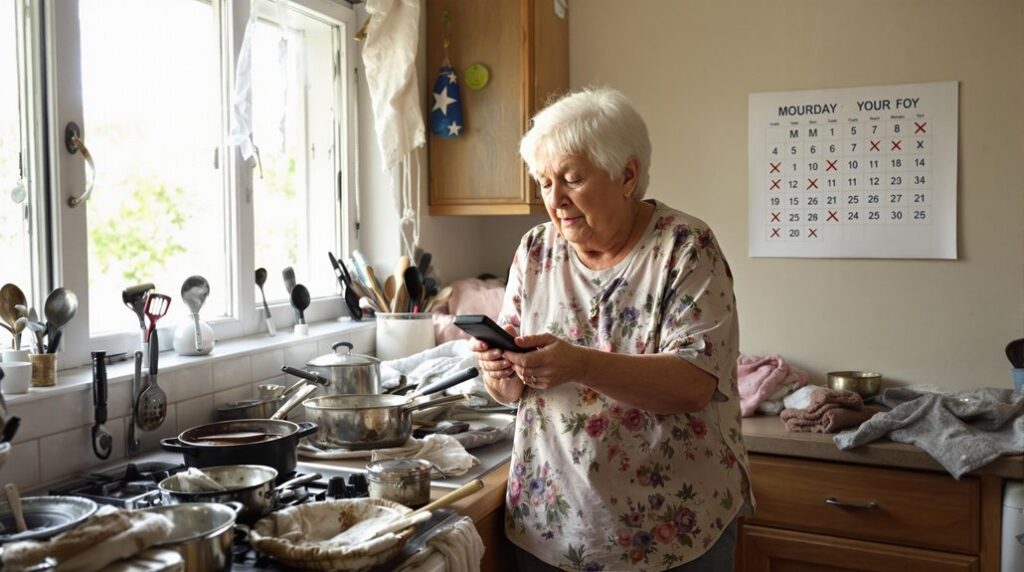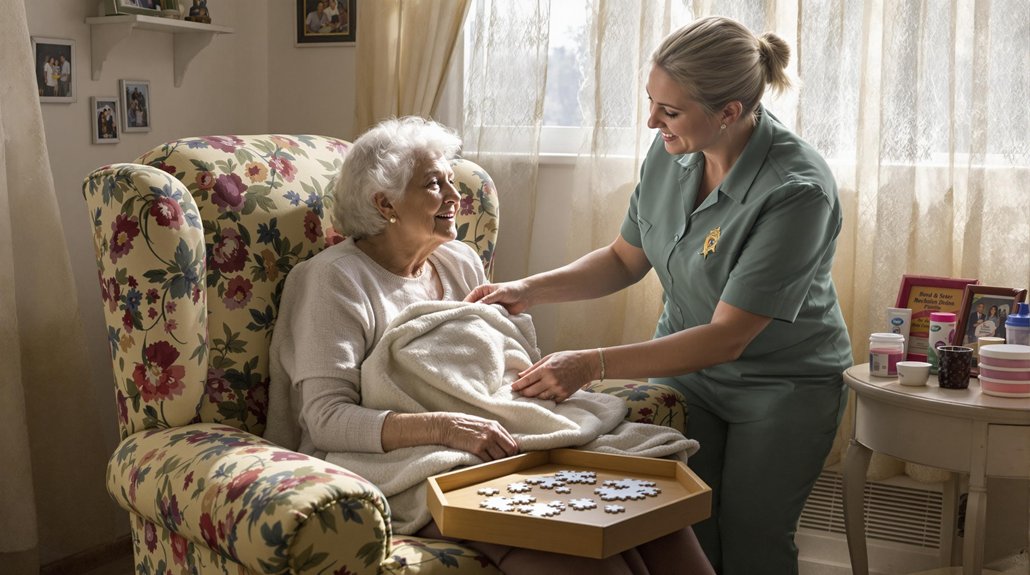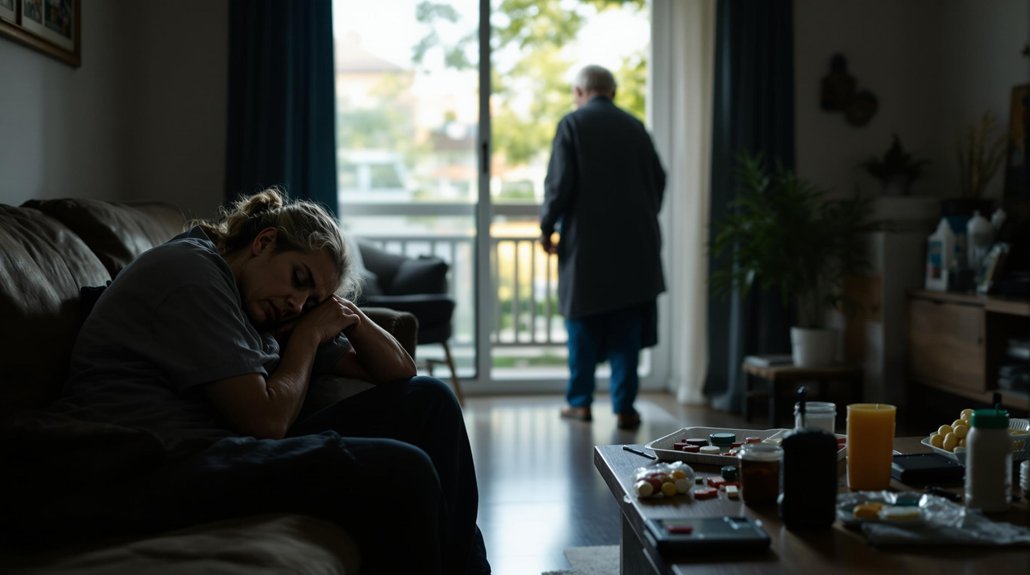Key signs of worsening dementia include increased memory loss, especially with recent events, and growing confusion about time and place. You’ll notice your loved one struggling more with daily tasks, personal hygiene, and communication. They may withdraw socially, show sudden mood changes, or become suspicious of others. Physical coordination often declines, leading to balance issues and falls. Understanding these changes will help you provide better support during each stage of progression.
Increasing Memory Loss and Confusion
The two most noticeable signs of worsening dementia are progressive memory loss and increasing confusion.
You’ll notice your loved one struggling more with memory recall, especially regarding recent events and conversations. They may ask the same questions repeatedly or fail to recognize familiar faces and places.
As cognitive decline progresses, you’ll observe them having greater difficulty with daily tasks they once managed easily.
They might forget how to operate household appliances, misplace items more frequently, or become confused about the time of day or their location.
You may also notice them struggling to follow conversations, finding the right words, or maintaining their train of thought.
These changes often develop gradually, so keeping a journal to track these symptoms can help you better support their care needs.
Cognitive support activities provided by trained caregivers can help maintain mental function as symptoms progress.
Changes in Communication Abilities
Communication difficulties represent a significant milestone in dementia’s progression.
You’ll notice your loved one struggling more with expressing thoughts and finding the right words. They may pause frequently during conversations, substitute incorrect words, or leave sentences unfinished. As language difficulties increase, they might repeat stories or questions multiple times without realizing it.
Watch for changes in how they interpret nonverbal cues and body language. They may misread facial expressions or fail to understand gestures they once easily recognized.
Changes in dementia can affect how someone understands facial expressions and gestures, making nonverbal communication increasingly challenging.
You’ll need to adjust your communication style by speaking more slowly, using simpler sentences, and maintaining eye contact. Pay attention to their body language too, as they might rely more on gestures and expressions when words become harder to find. This can help you better understand their needs and emotions.
Memory care specialists can provide expert guidance on communication techniques and behavioral management strategies to help both patients and families navigate these changes.
Declining Personal Care and Hygiene
Personal hygiene and self-care tasks become increasingly challenging as dementia progresses. You might notice your loved one forgetting to brush their teeth, comb their hair, or change their clothes. These changes in personal grooming habits often indicate that the condition is worsening.
Watch for signs that they’re struggling with daily routines like bathing, using the toilet, or getting dressed. They may put clothes on in the wrong order or wear inappropriate clothing for the weather.
You might also notice body odor, unkempt hair, or unwashed clothes becoming more frequent issues. Sometimes, they’ll resist help with these tasks out of frustration or confusion.
When you observe these changes, it’s important to step in sensitively and establish a structured care plan that maintains their dignity while ensuring their hygiene needs are met.
Personal care assistance from trained caregivers can help manage daily activities like bathing, dressing, and grooming when these tasks become difficult.
Behavioral and Personality Changes
As dementia advances, you’ll notice significant shifts in your loved one’s behavior and personality. Once outgoing individuals may experience sudden social withdrawal, avoiding friends and family gatherings they previously enjoyed.
You might observe unexpected mood swings, where they quickly shift from calm to agitated or from happy to tearful without apparent reason.
Your loved one may display increased suspicion, accusing others of stealing or harboring mistrust toward caregivers. They might act in ways that seem completely out of character, such as using inappropriate language or showing uncharacteristic aggression.
Some individuals lose their inhibitions, making socially inappropriate comments or actions. These changes can be particularly challenging for family members who remember their loved one’s original personality, but understanding these shifts as symptoms of the disease can help you respond with patience and compassion. Private duty nursing services can provide specialized support to help manage these behavioral changes while allowing your loved one to remain in their familiar home environment.
Loss of Physical Coordination
Physical coordination steadily deteriorates as dementia progresses into later stages.
You’ll notice your loved one experiencing increased difficulty with basic motor skills, like buttoning clothes, using utensils, or writing. Balance issues become more prominent, leading to an unsteady gait and higher risk of falls.
Watch for signs that they’re struggling to navigate familiar spaces, bumping into furniture, or having trouble judging distances. They may need help with tasks requiring hand-eye coordination, such as pouring drinks or reaching for objects.
You’ll want to modify their environment to prevent accidents and provide assistive devices when necessary. These physical changes often happen gradually, so keeping a watchful eye on their daily activities will help you anticipate and address their growing needs for support. Private duty nursing services can provide specialized assistance with mobility and fall prevention strategies to ensure safety at home.
Sleep Pattern Disruptions
Sleep disturbances often emerge alongside declining physical abilities in dementia patients.
You’ll notice your loved one’s normal sleep-wake cycle becoming increasingly disrupted, with periods of wakefulness during the night and excessive daytime sleepiness. These changes can be particularly challenging for caregivers.
As dementia progresses, nighttime wandering becomes more frequent.
You might find your loved one getting up repeatedly, appearing confused about time, or attempting to leave the house after dark. They may experience vivid dreams or hallucinations that disturb their rest.
To help manage these disruptions, you’ll need to establish consistent bedtime routines, secure the environment, and possibly consult their doctor about sleep interventions.
Maintaining a well-lit home during the day and dimming lights in the evening can help regulate their natural sleep patterns.
Safety Concerns and Judgment Issues
When dementia advances, safety concerns become increasingly apparent in daily activities. You’ll notice your loved one struggling with basic decision making difficulties, like leaving the stove on, forgetting to lock doors, or mishandling medications.
These lapses in judgment can create dangerous situations at home.
Watch for risky behaviors that might endanger their wellbeing. Your family member may attempt to drive despite getting lost frequently, wander outside during inappropriate times, or interact with strangers without normal caution.
They might also mismanage finances, fall for scams, or make poor choices about clothing for the weather.
Installing safety devices, removing hazardous items, and providing supervision during routine tasks can help protect them as their ability to recognize and respond to dangers diminishes.
Conclusion
Seeing changes in someone you love can feel like watching storm clouds gather. But knowing what signs to look for is like having a flashlight in the dark – it helps you find your way forward. When you spot these changes early, you can adjust your care and get the right help at the right time. Think of it as building a stronger safety net for your loved one.
Remember, you don’t have to walk this path alone. Many families face similar challenges, and there are caring people ready to support you. Every step you take to understand and respond to these changes helps keep your loved one safe and comfortable.
Taking action today means better care tomorrow. Your loved one needs you, and you need support too. If you or a loved one need help, don’t wait. Reach out to Focus Family Care today at (561) 693-1311 or email us at info@focusfamilycare.com.





